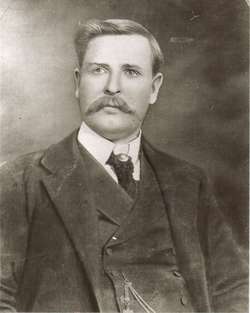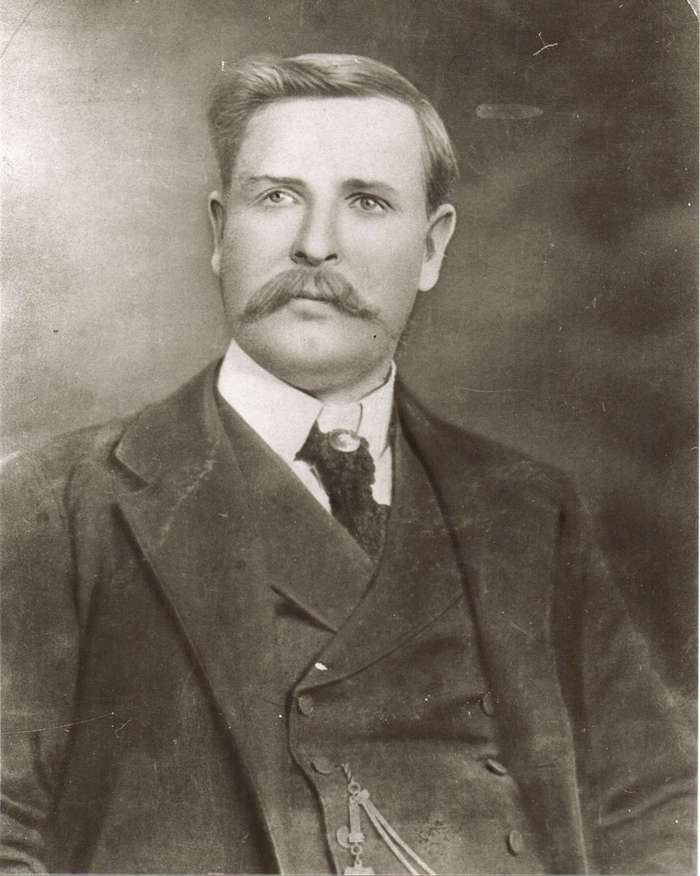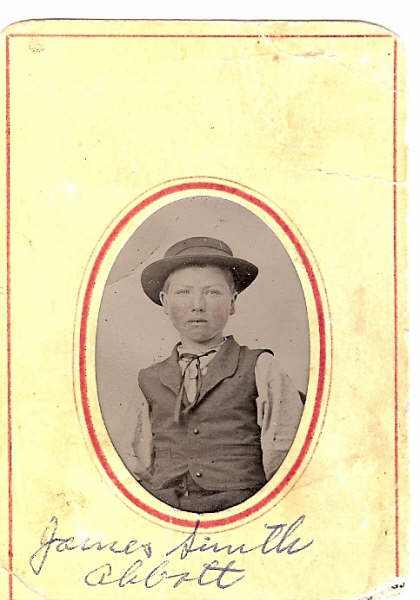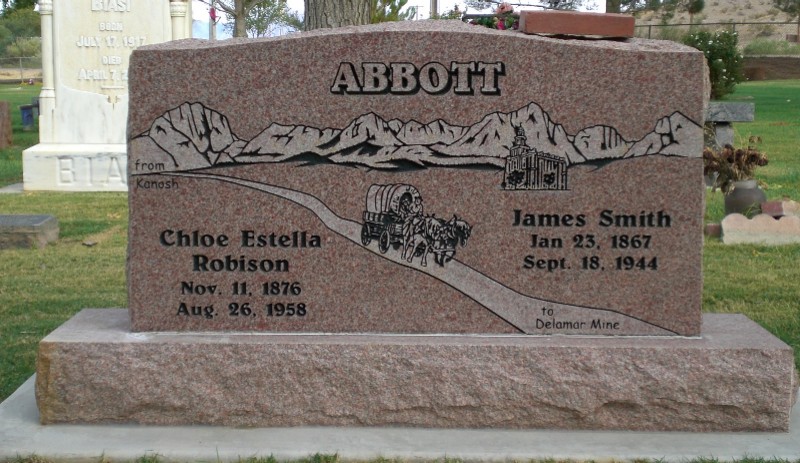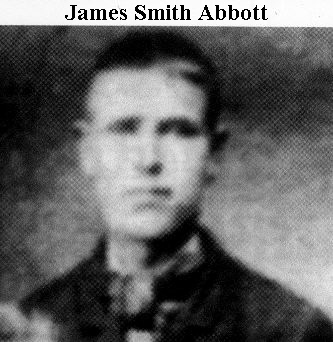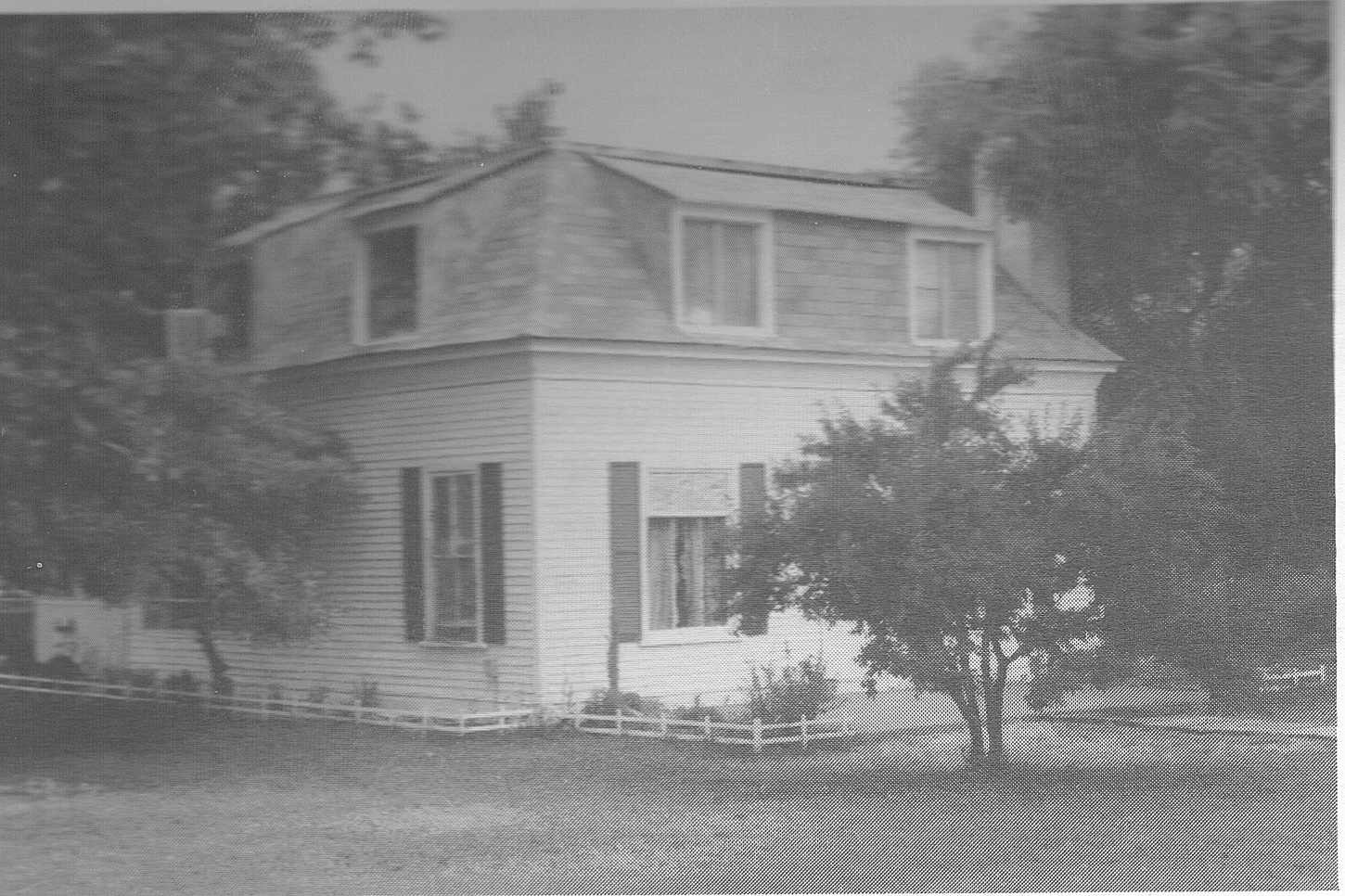My paternal grandfather was Stephen Abbott. My paternal Grandmother was Abigail Smith. My mother's father was Orvel Morgan Allen. Her mother was Jane Wilson. I was born 1868 in Eden, Utah. When I was 9 years old, my Father's brother in law, Edward Bunker,(the Bishop of Santa Clara) was ambitious to start a colony on the Virgin River where he hoped to establish the United Order of Enoch. He asked my Father, Myron, to join the colony and Father accepted the proposition. We traveled by ox team and wagon. I remember our stay in Santa Clara, then we pushed on and camped about a mile from Beaver Dams. We set up camp and were all tucked in and asleep when a group of young men came with fresh teams from the colony and hustled us along down the river which we crossed several times before reaching our destination. In the morning we found ourselves on the hill where the future builders of the town of Bunkerville were camped. The united order was already launched and the colonists were eating together in a make-shift board shack. They worked as a unit on the canal and the land. Sorghum cane was our principal crop. Over several years, more land was put under cultivation with cotton, cane and grain. The canal was extended and a wheel and flume built to power a cotton gin. My father built a hut and brush shed near the gin for us to live in and He and I operated the gin. The cotton was carried by wagon to Washington, Utah and exchanged for cloth and other articles. Most of our time was spent repairing the canal that would wash out frequently.
Quite a number of Indians lived along the river. They were poorly cared for living on rabbits, quail, rats, mice and lizards, and such as they could catch. The Indian boys were my playmates. I learned to shoot bow and arrow as well as they did.
We boys hoed and weeded the cane and cotton and the threshing was done by flail and horses. Though we were old enough to do the work, we were not old enough to attend the dances….Until… One day the Relief Society was putting on a dance and I owned the only fiddle around. They came for it for another man to play. I said, "My fiddle cannot go where I cannot." So… the program changed from then on.
While we lived at the gin a cow herd was organized and I was assigned the task of tending them down on the river bed. I was barefoot and there were many thorns and burrs and no fences with 52 head of cattle that sometimes worked me quite hard. Rations were meager, often a small pail of milk that clabbered before noon supplemented with mesquite beans when they were ripe.
At 16 I went to work with JD Earl who operated a blacksmith and cooper shop. I learned to rebuild wagon wheels and do all kinds of wagon work.
At 18 Father secured a mail contract for carrying mail between Bunkerville and St. Thomas. I was assigned the job to carry the mail by horseback.
At 19 I went to work in Beaver County, Utah for my Uncle
At 20 I attended Severe Stake Academy in Richfield finishing with honors.
After school my brother Myron Alma and I worked various jobs and while working for Bill Conder I met the girl who would be my wife.
At age 23 (1891) I received a letter from Box B with a call to serve a mission in New Zealand. I sold my cattle and horses and got a little money out of these. I went to Hinkley to see Miss Robison. I said, "If I were not going away I would ask you to marry me."
She replied, "Your going away need not interfere!"
We were engaged. We broke the news to her mother and told her we would like to be married very soon. She said we would have to wait a few days. I said, "Good enough, I have ten days to stay here then I must be off to get ready to go to New Zealand."
But during the day her mother came and said, "We're going to have the wedding this evening" and that was fine with me. That evening we were ready to be married when a young lady came and said, "The Bishop wants you to come to the meeting house. We walked to the meeting house to find a number of teams inside the fence. On walking inside the door we found two rows of tables loaded with everything good to eat and a hall filled with people. After the ceremony we received many gifts and enjoyed a nice program. One week later I was on my way to New Zealand.
My paternal grandfather was Stephen Abbott. My paternal Grandmother was Abigail Smith. My mother's father was Orvel Morgan Allen. Her mother was Jane Wilson. I was born 1868 in Eden, Utah. When I was 9 years old, my Father's brother in law, Edward Bunker,(the Bishop of Santa Clara) was ambitious to start a colony on the Virgin River where he hoped to establish the United Order of Enoch. He asked my Father, Myron, to join the colony and Father accepted the proposition. We traveled by ox team and wagon. I remember our stay in Santa Clara, then we pushed on and camped about a mile from Beaver Dams. We set up camp and were all tucked in and asleep when a group of young men came with fresh teams from the colony and hustled us along down the river which we crossed several times before reaching our destination. In the morning we found ourselves on the hill where the future builders of the town of Bunkerville were camped. The united order was already launched and the colonists were eating together in a make-shift board shack. They worked as a unit on the canal and the land. Sorghum cane was our principal crop. Over several years, more land was put under cultivation with cotton, cane and grain. The canal was extended and a wheel and flume built to power a cotton gin. My father built a hut and brush shed near the gin for us to live in and He and I operated the gin. The cotton was carried by wagon to Washington, Utah and exchanged for cloth and other articles. Most of our time was spent repairing the canal that would wash out frequently.
Quite a number of Indians lived along the river. They were poorly cared for living on rabbits, quail, rats, mice and lizards, and such as they could catch. The Indian boys were my playmates. I learned to shoot bow and arrow as well as they did.
We boys hoed and weeded the cane and cotton and the threshing was done by flail and horses. Though we were old enough to do the work, we were not old enough to attend the dances….Until… One day the Relief Society was putting on a dance and I owned the only fiddle around. They came for it for another man to play. I said, "My fiddle cannot go where I cannot." So… the program changed from then on.
While we lived at the gin a cow herd was organized and I was assigned the task of tending them down on the river bed. I was barefoot and there were many thorns and burrs and no fences with 52 head of cattle that sometimes worked me quite hard. Rations were meager, often a small pail of milk that clabbered before noon supplemented with mesquite beans when they were ripe.
At 16 I went to work with JD Earl who operated a blacksmith and cooper shop. I learned to rebuild wagon wheels and do all kinds of wagon work.
At 18 Father secured a mail contract for carrying mail between Bunkerville and St. Thomas. I was assigned the job to carry the mail by horseback.
At 19 I went to work in Beaver County, Utah for my Uncle
At 20 I attended Severe Stake Academy in Richfield finishing with honors.
After school my brother Myron Alma and I worked various jobs and while working for Bill Conder I met the girl who would be my wife.
At age 23 (1891) I received a letter from Box B with a call to serve a mission in New Zealand. I sold my cattle and horses and got a little money out of these. I went to Hinkley to see Miss Robison. I said, "If I were not going away I would ask you to marry me."
She replied, "Your going away need not interfere!"
We were engaged. We broke the news to her mother and told her we would like to be married very soon. She said we would have to wait a few days. I said, "Good enough, I have ten days to stay here then I must be off to get ready to go to New Zealand."
But during the day her mother came and said, "We're going to have the wedding this evening" and that was fine with me. That evening we were ready to be married when a young lady came and said, "The Bishop wants you to come to the meeting house. We walked to the meeting house to find a number of teams inside the fence. On walking inside the door we found two rows of tables loaded with everything good to eat and a hall filled with people. After the ceremony we received many gifts and enjoyed a nice program. One week later I was on my way to New Zealand.
Family Members
-
![]()
Myron Alma Abbott
1862–1932
-
![]()
Stephen Orville Abbott
1863–1884
-
![]()
Mary Luella Abbott Leavitt
1865–1955
-
![]()
William Elias Abbott
1869–1949
-
![]()
John Austin Abbott
1871–1954
-
![]()
Abigail Abbott
1874–1883
-
![]()
Emily Paulina Abbott Maddock
1871–1934
-
![]()
Effa Mae "Effie" Felts Fisk
1878–1947
-
![]()
Abigal Melvina Abbott Horsley
1879–1949
-
![]()
Gussie Dee Felts Bean Morris
1882–1909
-
![]()
Ezra Abiel Abbott
1882–1897
-
![]()
Sidney Smith Abbott
1884–1901
-
![]()
Lemuel Raymond Abbott
1885–1958
-
![]()
Thomas Edward Abbott
1887–1948
-
![]()
David Arthur Abbott
1888–1963
-
![]()
Samuel Abbott
1889–1957
-
![]()
Myron Decator Abbott
1890–1928
-
![]()
Lyman Abbott
1892–1916
-
![]()
George Nathan Abbott
1894–1965
-
![]()
Israel Abbott
1896–1966
-
Clarence Leon Abbott
1898–1965
-
![]()
Laura Josephine Abbott Miskin
1902–1926
-
![]()
Robert Leslie Abbott
1897–1969
-
![]()
James Ivan Abbott
1898–1978
-
![]()
Marvel Estella Abbott Pendleton
1900–1982
-
![]()
Ethel Abbott
1902–1902
-
![]()
Myrtle Evelyn Abbott Stephens
1902–1955
-
![]()
Hyrum F Abbott
1904–1904
-
![]()
Bertie Abbott Jorgensen
1906–1995
-
![]()
Adelman Smith Abbott
1908–1963
-
![]()
Rodella Abbott Ostergard
1909–2005
-
![]()
Serene Abbott Ziemer
1911–1984
-
![]()
SGT Stephen Elmer Abbott
1913–1977
-
![]()
Adelia Abbott McIntire Webb
1915–1997
-
![]()
Erma Abbott LeMmon
1918–2003
-
![]()
Jean Abbott Hughes
1920–2005
Sponsored by Ancestry
Advertisement
Explore more
Sponsored by Ancestry
Advertisement
